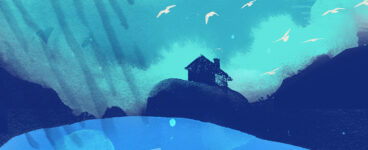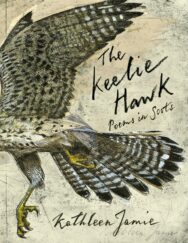‘There. Whitivver rises/ will drift back doon./ Whit this dey brings ye’ll face.’
Our outgoing Makar’s newest poetry collection is a treat; celebrating language, people, nature and place. We’re thrilled to bring you a selection of poems, tantalising you with a little taster!
The Keelie Hawk
By Kathleen Jamie
Published by Picador
Killileepie
Mind hou we sclimt a cleuch whaur a wheen birks grou’d, bieldit frae hungry deer, syne follaed the burn till we cam tae an airie amang laigh hills? Norwast stuid snaw-happit summits, and alang the burnside lay larachs and green knowes: traces o the fowk at yaised tae bide here aw simmer, takkin tent o thir kye. The map gied the burn as the Allt na Maddy. Wolves maun hae drank here, aince.
Thur wis whaups, and a burd that dairtit up and doon the watter-side pipin Too-wee! Too wee wee wee! Mind we laucht – whit’s too wee? The moontains? Mibbes the river, thon wad hae been a michty glacier lang syne. In the tent we dovert an oor or twa, syne unzippit the flap and crept ootside. The glen wis eldricht wi muinlicht, the faurawa snaw-patches glentit. Ye howlt lik a wolf! But we’ve done awa wi thaim sae naethin answert bar the echo. And thon burd threapin –
too wee wee wee
Ah hinnae been back but thon freetfu craitur aye chides me nou and again. It flees in the door and oot the windae, giein its advice whan Ah’m sat here warplin wi wirds. Too wee! And aye, mibbes we did ware oot oor ambition ower suin – campin in the ruins, sae tae speik, and no ettlin fir the heichts . . . Is it ower late? Ah doot we’ll suin gang the wey o the glaciers, the wolves, the shielin fowk and become pairt o the laun’s lang dwam o mindin and forgettin.
But it’s worth a shottie, eh no? Meet me the morn and we’ll gang.
Remember when we climbed a gorge where a few birches grew sheltered from the hungry deer then followed the stream till we came to a pasture among low hills? Northwest stood snowcapped summits and along the riverside lay the sites of abandoned buildings and green knolls, traces of the folk who used to stay here all summer, looking after their cattle. The map gave the river as the Allt na Maddy. Wolves must have drunk here once. There were curlews and a bird that darted up and down the water-side piping too wee, too wee wee wee. Remember we laughed? What’s too small? The mountains? Maybe the river, that would have been a mighty glacier long ago. In the tent we dozed for an hour or two, then unzipped the flap and crept outside. The glen was eerie in moonlight, the faraway snow patches glinted. You howled like a wolf! But we’ve done away with them and nothing answered except the echo, and that bird persisting too wee wee wee. I’ve never returned but that fretful creature still chides me now and again. It flies in the door and out of the window, giving its advice when I’m sitting here wrestling with words. Too wee! And yes, perhaps we did spend our ambition too soon, camping in the ruins, so to speak, instead of striving for the heights . . . Is it too late? I expect we’ll soon go the way of the glaciers, the wolves, the shieling people, and become part of the land’s long dream of remembering and forgetting. But it’s worth a try, isn’t it? Meet me tomorrow and we’ll go.
The Brig
Ah wis walkin ma lane
amang eastern moontains
the heichmaist snaw-peaks
gowden at dey’s dawn
while deep in a cleuch
a gush o silt and glacier-melt
fled frae its origins
’mang the hiechmaist craigs.
Syne: cock’s craw,
dung-reek, a wheen
cley biggins, and awriddy
sweein oot ower the torrent
on a brig o twistit strae:
aw the clachan’s
weemin-fowk, awa
tae thir darg in the fields.
Whit fields, ye micht wunner,
amang sic moontains?
Whit lifes, thae weemin
crossin yon chasm wi thir creels?
Ah wis naethin then,
jist a stravaiger; ‘haunless’,
ma mither yaised tae sey.
Wad Ah gang back?
Aye, mibbe,
had a wumman’s weird
no catcht at me an aw,
syne Ah wannert hame.
But weel Ah mind o thae
ayebidin summits,
cauld as daith
at brek o dey,
and hou Ah wis fine
wi jist the river’s roar
fur company, traivelin
ma lee-lane wey.
I was walking alone among eastern mountains, the highest snowpeaks golden at the day’s dawn while deep in a ravine a gush of silt and glacier melt fled its origins amongst the frightening crags.
Then: cock’s crow, smell of dung, a few clay buildings, and already swaying out over the torrent, the womenfolk of the village off to their day’s labour in the fields. What fields, you might wonder,
among such mountains? What lives, those women, crossing the chasm with baskets on their backs? I was nothing then, just a wanderer. ‘Incompetent’, my mother used to say. Would I go back? Yes, perhaps, had a woman’s fate not caught me too, as soon as I wandered home. But well I recall those eternal summits, as cold as death in the early light of day, and how I was content with the river’s roar for company, travelling my way alone.
Sirius
Dug-stern,
gairdin the yett
atween ane year and the neist –
weel micht ye blinter
emerant and reid
as ye lowp oor southron lift.
Wi anely this ae
flicht o a Yird, this
ae speck o stour
that alane can tak tent o ye,
hou wad ye no
bleeze at us?
Ilka dug maun
hae its dey, and thur’s
naewhaur ither can cry ye
by thon or onie name.
No that ye hear us,
birlin throu oor ain
swith-passin deys.
We live and dee – and whiles,
on clear howe o winter nichts
we see ye kythe,
leamin abuin the Black Craig,
stern o the bricht stern stare.
Dog star, guarding the gate between one year and the next, well might you glitter emerald and red as you leap our southern sky. With only this single speck of an Earth, this one mote of dust that alone can pay heed to you, why wouldn’t you blaze at us? Every dog must have its day and there’s nowhere else that can call you by that or any other name. Not that you hear us, spinning through our own swiftly passing days. We live and die and from time to time on clear midwinter nights we see you appear, glowing above the Black Craig, star of the bright stern stare.
The Ordinar
Waukrife, alane,
ye’re hunkert on the doorstane
lissenin while a daw-haze
o loss and bliss
speels frae the neebourhood’s
ordinarness: its scroggit
cooncil sycamore, thon
floorishin buss
ye’d nivver afore
taen tent o. Leastweys,
ye want tae cry it
‘loss’ and ‘bliss’
thon up-driftin
brek-o-dey veil . . .
As fir thae crocuses
thrangit in a crackit pot
jist by yer anklet
– whit’s thon purpie?
‘Warld-luve’.
Warld-luve?
Hou no? Naebodie’s
nearaboots tae lauch.
Ye could e’en mibbes
cry it alood:
Bliss! Loss! Warld-luve!
There. Whitivver rises
will drift back doon.
Whit this dey brings ye’ll face.
Wakeful, alone, you’re hunkered on the doorstep listening as a dawn-haze of loss and bliss ascends from the neighbourhood’s ordinariness, its stunted council sycamore, that blossoming bush you’d never noticed before. At least, you want to call it ‘loss’ and ‘bliss’, that up-drifting break-of-day veil. As for those crocuses crowded in a cracked pot just by your ankle, what’s that purple? World-love. World-love? Why not? Nobody is around to laugh. You could perhaps even shout it out loud: Bliss! Loss! World-love! There, whatever rises will drift back down. What this day brings you’ll face.
The Keelie Hawk by Kathleen Jamie is published by Picador, priced £12.99.
ALSO IN THIS ISSUE

 Two Times Murder: A Q & A with Adam Oyebanji
Two Times Murder: A Q & A with Adam Oyebanji
‘Two Times Murder is a genuinely fair play murder mystery. If a reader solves it, I’m delighted. A …

 The Book … According to Malachy Tallack
The Book … According to Malachy Tallack
‘The most beautiful books are often those that make you look anew at something that previously felt …













